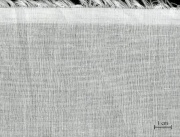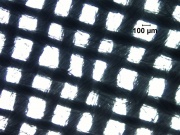Difference between revisions of "Batiste"
Jump to navigation
Jump to search
m (Text replace - "== Authority ==" to "== Sources Checked for Data in Record ==") |
|||
| Line 17: | Line 17: | ||
| − | == | + | == Sources Checked for Data in Record == |
* Hoechst Celanese Corporation, ''Dictionary of Fiber & Textile Technology'' (older version called Man-made Fiber and Textile Dictionary, 1965), Hoechst Celanese Corporation, Charlotte NC, 1990 | * Hoechst Celanese Corporation, ''Dictionary of Fiber & Textile Technology'' (older version called Man-made Fiber and Textile Dictionary, 1965), Hoechst Celanese Corporation, Charlotte NC, 1990 | ||
Revision as of 13:02, 29 April 2016
Description
A fine, sheer, plain weave fabric originally made from Linen during the 13th century. Cotton replaced linen for making batiste in the 19th century, and now it also made from cotton blends and synthetic fibers. The fine, linen-like fabric is used for lingerie, blouses, shirts, dresses, and handkerchiefs. Some plain weave, sheer fabrics made from Wool and Silk are also called batiste.
Synonyms and Related Terms
batiste de soie (Fr.); batista (Esp.); batist (Ned); baptiste;
Additional Images
Sources Checked for Data in Record
- Hoechst Celanese Corporation, Dictionary of Fiber & Textile Technology (older version called Man-made Fiber and Textile Dictionary, 1965), Hoechst Celanese Corporation, Charlotte NC, 1990
- Marjory L. Joseph, Introductory Textile Science, Holt, Rinehart and Winston, Fort Worth, TX, 1986
- G.S.Brady, Materials Handbook, McGraw-Hill Book Co., New York, 1971 Comment: p. 247
- Edward Reich, Carlton J. Siegler, Consumer Goods: How to Know and Use Them, American Book Company, New York City, 1937
- Random House, Webster's Encyclopedic Unabridged Dictionary of the English Language, Grammercy Book, New York, 1997
- The American Heritage Dictionary or Encarta, via Microsoft Bookshelf 98, Microsoft Corp., 1998


